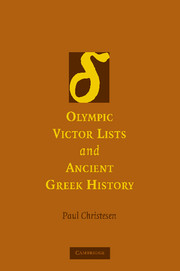Book contents
- Frontmatter
- Contents
- List of Illustrations
- List of Tables
- Preface
- A Note on Terminology, Transliterations, and Editions
- 1 An Introduction to Olympic Victor Lists
- 2 Hippias of Elis and the First Olympic Victor List
- 3 Olympionikon Anagraphai and Standard Catalogs of Olympic Victors
- 4 Olympiad Chronographies
- 5 Olympiad Chronicles
- 6 Conclusion
- Appendices
- 1.1 Scopas
- 1.2 Tiberius Claudius Polybius
- 1.3 Aristodemus of Elis
- 2 Hippias of Elis
- 3.1 Aristotle's Olympionikon Anagraphe
- 3.2 Eratosthenes' Olympionikon Anagraphe
- 3.3 The Aristotelian Pythionikai
- 3.4 POxy II 222
- 3.5 IG II2 2326
- 4.1 The Eusebian Olympic Victor List
- 4.2 Timaeus of Tauromenium
- 4.3 Dionysius of Halicarnassus
- 5.1 Philochorus
- 5.2 Ctesicles
- 5.3 Diodorus Siculus
- 5.4 Castor of Rhodes
- 5.5 Dionysius of Halicarnassus
- 5.6 Thallus
- 5.7 Phlegon
- 5.8 POxy XVII 2082
- 5.9 POxy I 12
- 5.10 Cassius Longinus
- 5.11 Dexippus
- 6 A Catalog of Olympic Victors Before Hippias?
- 7 Aristotle on the Foundation of the Olympic Truce and of the Olympic Games
- 8 Olympiads and Pankration Victors in Thucydides
- 9 More on the Accuracy of Hippias' Olympic Victor Catalog
- 10 The Olympic Victor List and the First Messenian War
- 11 Memorization and the olympic victor list
- 12 Hippias' Calculation of the Date of 776
- 13 The Spartan King Lists
- 14 Variant Olympiad Dating Systems
- 15 Menaechmus of Sicyon's Pythikos
- 16 The Sicyonian Anagraphe
- 17 Relationships between Olympionikai
- Bibliography
- General Index
- Index Locorum
7 - Aristotle on the Foundation of the Olympic Truce and of the Olympic Games
Published online by Cambridge University Press: 23 November 2009
- Frontmatter
- Contents
- List of Illustrations
- List of Tables
- Preface
- A Note on Terminology, Transliterations, and Editions
- 1 An Introduction to Olympic Victor Lists
- 2 Hippias of Elis and the First Olympic Victor List
- 3 Olympionikon Anagraphai and Standard Catalogs of Olympic Victors
- 4 Olympiad Chronographies
- 5 Olympiad Chronicles
- 6 Conclusion
- Appendices
- 1.1 Scopas
- 1.2 Tiberius Claudius Polybius
- 1.3 Aristodemus of Elis
- 2 Hippias of Elis
- 3.1 Aristotle's Olympionikon Anagraphe
- 3.2 Eratosthenes' Olympionikon Anagraphe
- 3.3 The Aristotelian Pythionikai
- 3.4 POxy II 222
- 3.5 IG II2 2326
- 4.1 The Eusebian Olympic Victor List
- 4.2 Timaeus of Tauromenium
- 4.3 Dionysius of Halicarnassus
- 5.1 Philochorus
- 5.2 Ctesicles
- 5.3 Diodorus Siculus
- 5.4 Castor of Rhodes
- 5.5 Dionysius of Halicarnassus
- 5.6 Thallus
- 5.7 Phlegon
- 5.8 POxy XVII 2082
- 5.9 POxy I 12
- 5.10 Cassius Longinus
- 5.11 Dexippus
- 6 A Catalog of Olympic Victors Before Hippias?
- 7 Aristotle on the Foundation of the Olympic Truce and of the Olympic Games
- 8 Olympiads and Pankration Victors in Thucydides
- 9 More on the Accuracy of Hippias' Olympic Victor Catalog
- 10 The Olympic Victor List and the First Messenian War
- 11 Memorization and the olympic victor list
- 12 Hippias' Calculation of the Date of 776
- 13 The Spartan King Lists
- 14 Variant Olympiad Dating Systems
- 15 Menaechmus of Sicyon's Pythikos
- 16 The Sicyonian Anagraphe
- 17 Relationships between Olympionikai
- Bibliography
- General Index
- Index Locorum
Summary
Some scholars believe that Aristotle's view was that Iphitos reestablished the Olympics on his own and worked with Lycurgus only in regard to the truce. These scholars point to the facts that Plutarch (Lycurgus 1.1) mentions only the Olympic truce when discussing the connection Aristotle made between Lycurgus and Iphitos and that Spartans do not appear in the Olympic victor list until the 15th Olympiad. The separation of the founding of the truce and the reestablishment of the Olympics makes it possible to argue that the truce was founded after Iphitos reestablished the Games. Scholars who adapt this position tend to date the foundation of the Olympic truce to around 720, when the Spartans' conquest of Messenia gave them direct access to Elis and when Spartans begin appearing in the Olympic victor list.
One must, however, keep in mind that Aristotle (and almost certainly Hippias before him) used the discus to establish a date for the beginning of the series of continuous Olympiads and that the discus was inscribed with the terms of the Olympic truce and did not offer a lengthy history of the Olympics. The summary given in Plutarch (and Heraclides Lembus; see footnote 32 of Chapter 2) is thus a reflection of a precise statement by Aristotle based on the evidence at hand and the purpose for which that evidence was used.
- Type
- Chapter
- Information
- Olympic Victor Lists and Ancient Greek History , pp. 466 - 467Publisher: Cambridge University PressPrint publication year: 2007



